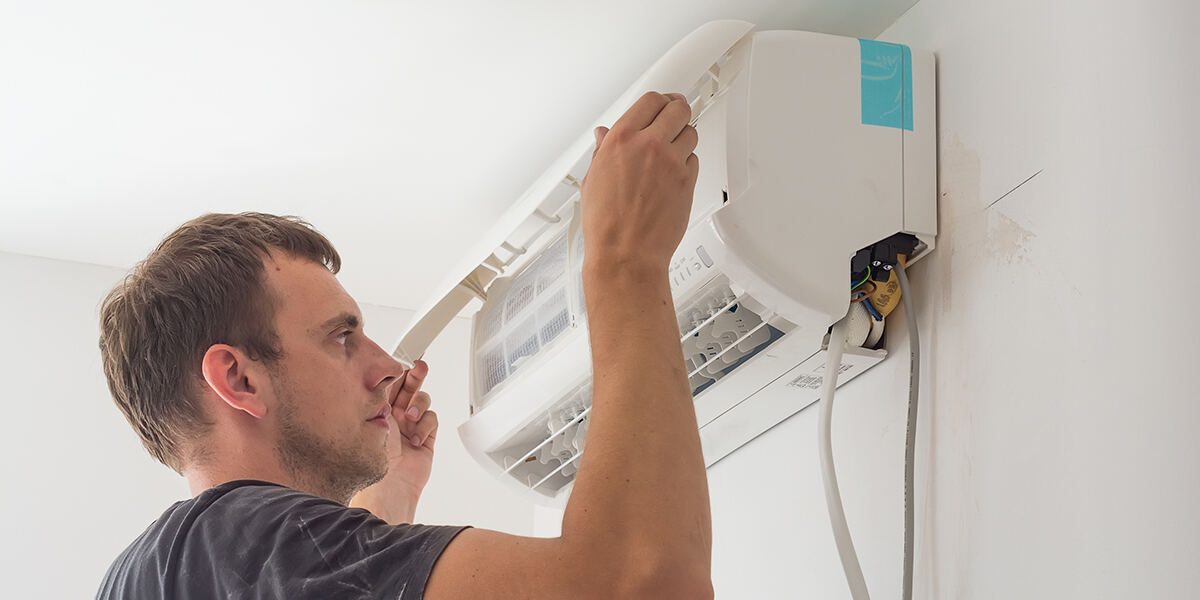
If your air conditioner suddenly stops working in the middle of a sweltering Florida summer, it’s easy to assume the worst. But before you panic, it’s worth learning how to tell if an AC fuse is blown. A small, inexpensive fuse might be the only thing standing between you and a cool, comfortable home.
As the leader in professional air conditioning repair in Tallahassee, Florida, Cooper’s Plumbing & Air knows how essential your cooling system is. Here’s what you need to know about air conditioner fuses.
Why Air Conditioner Fuses Matter
Air conditioners draw a significant amount of electricity, especially during startup. To protect vital components from electrical damage caused by surges, overloads, or short circuits, manufacturers install fuses. They’re typically located in a disconnect box near the outdoor condenser unit. These fuses are designed to “blow” or interrupt the circuit when the electrical load exceeds safe limits.
When a fuse blows, it cuts power to the affected part of the system. That’s why blown AC fuse symptoms are often mistaken for more serious equipment failures.
Common Signs of a Blown AC Fuse
Spotting an HVAC not cooling due to fuse issues early can help you avoid unnecessary service calls. Here’s how to tell if an AC fuse is blown:
-
No power to the outdoor unit: If the indoor blower is running but the condenser outside is completely silent, a blown fuse could be the cause.
-
The air conditioner won’t turn on at all: Your thermostat may be active, but there’s no cooling, no fan, and no compressor response from the unit.
-
Warm air from vents: The indoor system might operate, but if the outdoor unit isn’t running, you’ll feel warm or room-temperature air.
-
Burning smells or physical damage: Scorch marks on the fuse or melted plastic components near the disconnect box signal potential serious electrical problems.
These are classic AC fuse failure signs. However, to be certain, you’ll need to inspect the fuse directly.
Where To Look: AC Fuse Box Inspection
To begin your AC fuse box inspection, first locate the disconnect box. You’ll typically find it mounted on the exterior wall near the outdoor unit. This weatherproof enclosure contains the system’s high-voltage protection and may house one of two components:
-
Cartridge fuses: Cylindrical, plug-in fuses inserted into metal clips.
-
Pull-out fuse blocks: Plastic handles with embedded fuses that disconnect power when removed.
Safety must be the first consideration when knowing how to tell if an AC fuse is blown. Before opening the box, be absolutely certain to turn off the power at the main electrical panel. There are serious risks of potentially deadly electrical shocks when handling high-voltage components.
How To Check AC Fuse Continuity
If you have a multimeter, you can check AC fuse continuity to determine whether the fuse is still good. Follow these steps carefully:
-
Shut off all power to your air conditioning system at the breaker box.
-
Remove the fuse from the disconnect box after verifying the unit is off.
-
Set your multimeter to continuity mode or the ohms (Ω) setting.
-
Touch the probes to both ends of the fuse.
A good fuse will trigger a beep or a low-resistance reading (close to 0 ohms). A blown fuse shows no continuity or “OL” (infinite resistance). This test is the most accurate way to confirm a fuse issue when visual damage isn’t obvious.
What Causes AC Fuses To Blow?
Understanding why a fuse failed is key to proper AC unit fuse troubleshooting. In Tallahassee’s humid climate, these are the most common causes:
-
Short circuits, often due to deteriorated insulation or corroded wires.
-
Electrical overloads, such as malfunctioning parts like compressors or motors, demand too much power.
-
Clogged filters or coils force the system to work harder than normal.
-
Old equipment is more likely to experience wiring issues or component fatigue in Florida’s extreme weather.
Part of knowing how to tell if an AC fuse is blown means avoiding replacing it repeatedly. That means something deeper needs attention.
How To Replace a Blown AC Fuse
If your inspection confirms a blown fuse and the system seems otherwise functional, you can replace it by:
-
Turning off power at both the breaker panel and disconnect box
-
Removing the old fuse and checking the amp rating
-
Buying a matching replacement (same type, voltage, and amperage)
-
Inserting the new fuse securely and restoring power
After replacing a fuse, carefully monitor your system’s operation. If it fails again quickly, shut it down and call a technician immediately. You may be dealing with a serious electrical or mechanical fault.
Frequently Asked Questions
Here are some additional questions Tallahassee homeowners often ask about cooling unit fuses.
Can a Blown AC Fuse Affect My Thermostat?
A blown AC fuse won’t directly affect your thermostat, but if the fuse disrupts power to the condenser, your thermostat may keep running without triggering cooling, which means ineffective temperature control.
Is It Safe To Bypass an Air Conditioner Fuse Temporarily?
It’s never safe to bypass an air conditioner fuse. That creates a serious fire hazard and risks damaging expensive components, so always replace the fuse properly or call a licensed technician.
Can Lightning Storms in Florida Cause My Air Conditioner Fuse To Blow?
The lighting storms we often experience in and around Tallahassee certainly can cause an air conditioner fuse to blow. If you haven’t yet, consider installing a modern surge protector to preserve your system during rough weather.
Don’t Sweat It — Call the Tallahassee Air Conditioning Experts With Cooper’s Plumbing & Air
Now that we’ve looked into how to tell if an AC fuse is blown, you’re better equipped to handle one of the most common air conditioning problems. Of course, electrical work isn’t for everyone. When in doubt, trust the professionals.
Cooper’s Plumbing & Air has helped Tallahassee residents and businesses stay cool and safe for over a decade. Whether you need help with AC fuse box inspection, AC unit fuse troubleshooting, or full system diagnostics, we’ve got you covered.
Call (866) 464-7132 today or schedule your service online. We’re here when your comfort’s on the line.
